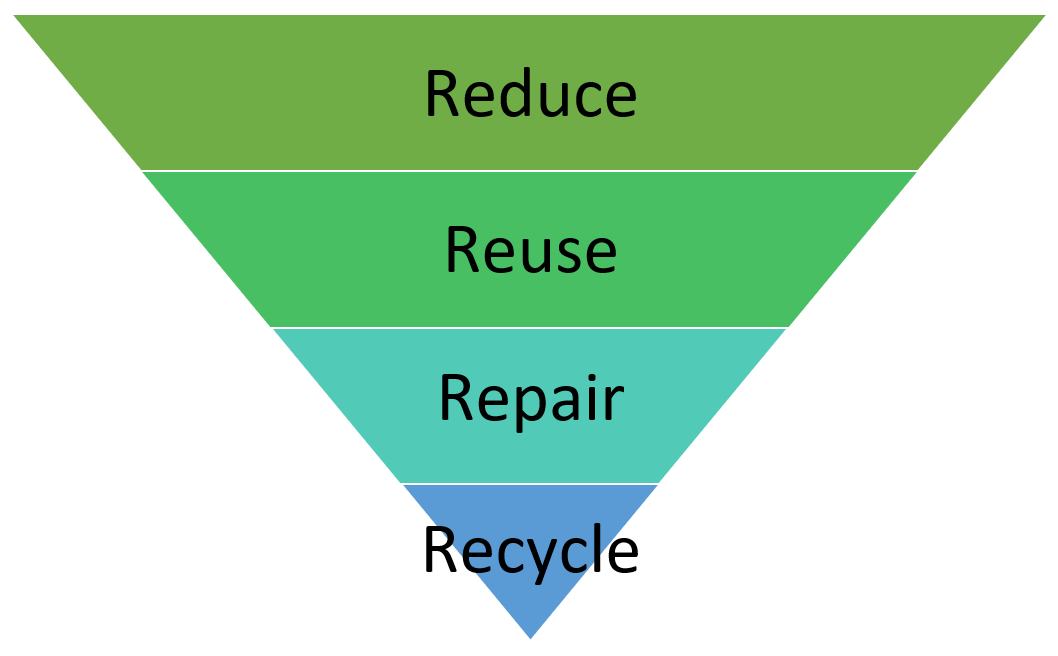By Finnur Ricart and Ana Sofia Reyna, Y13
This week, the members of the Eco-Committee were asked what they are doing to reduce their environmental impact. A pattern arose throughout their responses showing that their actions mostly followed the 4 R’s of the sustainability pyramid. As seen below, those are: reduce, reuse, repair and recycle.
In their answers, we could see that they are reducing their impact in two main areas: waste production and their carbon footprint. As mentioned before they are achieving this by applying the 4 R’s of the sustainability pyramid. We have summarised their responses in this article as we believe it’s important to hear about what others are doing, in order to get inspiration for what we can apply to reduce our environmental impact.
Some members shared that they are reducing the amount of stuff they buy, such as clothes, accessories, and technology. Doing this is important because every item we buy carries a carbon footprint from its production. Not only that, but they often have unnecessary or excessive packaging. Moreover, if they really need something, they make sure to purchase them from second-hand stores, so that the items may be reused. Doing this, although it might not feel like much, creates a simple loop that will extend the lifetime of clothes and other items, such as furniture. To become a part of this cycle, instead of throwing out clothes we no longer use, we can donate them to a second-hand store, or simply give them to a friend. After that, we can then buy clothes from the second-hand stores, or accept other clothes from our friends. To help you partake in this cycle, here is a useful link to a great second-hand clothing store where you are likely to find just what you are looking for.
For another way in which we can reduce the number of clothing items we buy, try following the example of some other Eco-committee members who repair their old clothes by sewing any tears on their clothes. This allows them to extend the lifetime of their clothes and enable them to add details to old clothes, giving them a new style, and helping them avoid buying into fast-fashion. Ultimately, they thus reduce their environmental impact. We can take on actions like these to reduce our impact as well.
Most members of the Eco-Committee told us they also apply the reducing principle to limit the plastic packaging of the food they buy. This helps keep down the amount of waste they produce. Furthermore, they keep this principle in mind when they travel. They reduce their trips by airplane and car and try to replace them with trains, buses, trams and bikes. These actions enable them to limit their carbon footprint. One member told us they use the Donkey Republic bike rental service to get around town. This service is offered at the new Leman Express train stations and other places downtown where you can unlock a bike, go wherever you need to go, and then return it at any of the 8 rental stations.
Our carbon footprint is something much less visible to us than the waste we produce. Not only do our clothes and other items we buy carry a carbon footprint, but so does the food we eat. Reducing the carbon footprint of our diet may seem tricky, but a few of the Eco-Committee members have some good solutions. Reducing the amount of meat, especially red meat, we eat is one of the simplest and most effective ways of reducing the effect of your food on the environment. As meat can be an important source of protein, they have found protein-rich substitutes like peas, beans and cereals such as quinoa. These plant based foods usually carry a much lower environmental impact both in terms of their water and carbon footprint. However, it is also important to look at where our food is coming from.
Eating locally produced food is another method by which our members are managing to limit their environmental impact. This reduces the distance by which the foods have to be transported and, therefore, lowers their carbon footprint. Ordering fruit and vegetables from Aux Petits Ognions is a great way for people living in Geneva to eat local and in season. If you happen to be vegetarian, you might even be able to source all of your food from them!
We hope to have highlighted some simple things you can do to reduce your environmental impact. Even if recycling is already very important in your family, we also encourage you to look through the solutions again and challenge yourself and/or your family for a week and see how it goes. If it works for you, who knows, maybe it will stick!



